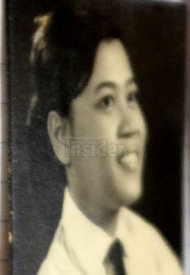The sister of Siti Aishah Abdul Wahab, who is believed to be one of the three women rescued from 30 years of slavery in London, has vowed not to return without seeing her sister.
Siti Aishah’s sister vows not to return until she meets the freed Malaysian “slave”
Kamar Mahtum Abdul Wahab, who left for London last night, said that although it was not confirmed if the 69-year-old Malaysian woman was indeed her sister, her instinct tells her it is.
"I will not return to Malaysia until I meet her," she told The Malaysian Insider when met at the Kuala Lumpur International Airport last night.
Siti Aishah was among three women, including a 30-year-old British and 57-year-old Irish nationals, who were rescued on October 25 from a home in London's Lambeth district. It is believed that the women were enslaved by a Maoist cult.
Yesterday, the Daily Mail identified the youngest victim as Rosie Davis.
Kamar, whose hopes of finding her long-lost sister was rekindled with the reports, admitted that she was worried if her sister would want to meet her.
"If she is my sister, I am happy. But would she be happy to see me?
"She might have changed but I have a feeling it is her. I will still think of her as my sister if it is really her," the former teacher said.
Siti Aishah, she pointed out, has paid for all her mistakes.
"She was a smart student. She should do something for the country," she went on, holding back tears.
"They have to help me. They have to," she said, referring to the Malaysian High Commission in the UK.
Kamar revealed that Siti Aishah's disappearance had left the family heartbroken, adding that their mother’s dying wish had been to know what had happened to her daughter.
“I have felt so choked without her for years and years. She was so talented, she was the apple of my mother’s eye. My mother asked for her on her death bed," the Daily Telegraph reported Kamar as saying.
"When our mother died, she (Siti Aishah) would not talk to us and I couldn't do anything," she told the British daily.
Meanwhile, former student activist Hishamuddin Rais, who had first indicated the possible identity of the Malaysian "slave" as Siti Aishah in a report carried by The Malaysian Insider yesterday, is joining Kamar on her trip to London.
"I am helping because I know Siti Aishah. I have known her since I was a child.
"In fact, her sister used to be my teacher in school. In London, years ago, her brother approached me for help to locate her," he added.

Hishamuddin, who went into self-exile in London in the 1970s, said Siti Aishah (pic, left) was active with Malaysian students in a leftist group that called itself "New Malayan Youth" in the British capital city at that time.
Kamar confirmed this information to The Daily Telegraph, adding that Siti Aishah had gone missing 30 years ago in London after joining a Maoist group.
Meanwhile, it was reported that the Malaysian High Commission in London, who has yet to meet the Malaysian woman who was rescued, has appealed to British authorities to allow them to speak to her.
High Commissioner Datuk Seri Zakaria Sulong lamented that the nationality of the woman could not be confirmed although several local dailies had also reported similar backgrounds and personalities involved.
"We need to talk to this woman to establish her nationality immediately. At the moment, the police are not allowing us to meet her.
"We are naturally concerned and are doing whatever we can to assist her. This includes sending her home, if she is indeed Malaysian,” he was quoted as saying.
Zakaria pointed out that the High Commission could not confirm the woman's nationality based solely on non-governmental organisation Freedom Charity's declaration and appealed to those who have missing relatives in London to come forward.
Foreign Minister Datuk Seri Anifah Aman had previously said that Wisma Putra was seeking details on the case.
British dailies named those arrested for allegedly enslaving the three women as Indian-born Aravindan Balakrishnan, also known as "Comrade Bala", and his Tanzanian wife Chanda.
Hishamuddin pointed out that the male suspect was also called "Chairman Ara" and was from Singapore.
Police have confirmed that the couple was arrested in the 1970s, without disclosing any details.
Detectives have refused to confirm the identities of the couple, who are now on bail until January, pending further investigations but said the captive women were brainwashed and had reported being beaten but did not appear to have been sexually abused.
They were occasionally allowed out of the house and detectives are working to understand the "invisible handcuffs" that were used to control them.
Police revealed on Saturday that the two older victims had met their male captor through a "shared political ideology" and initially lived with him as part of a collective.
Police said on Monday they were investigating 13 addresses linked to the couple who came to Britain in the 1960s and are suspected of immigration offences as well as involvement in forced labour.
Detectives carried out house-to-house inquiries over the weekend in Brixton, one of London's poorer, more ethnically diverse districts that was the scene of anti-government riots in the 1980s.
The exact address where the women were held at have not been identified, but the police operation was centred on a modern, low-rise block of flats in Brixton's Peckford Place. - November 27, 2013.



No comments:
Post a Comment